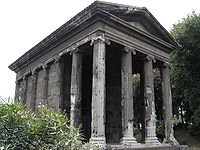
Portunes
Encyclopedia

Roman mythology
Roman mythology is the body of traditional stories pertaining to ancient Rome's legendary origins and religious system, as represented in the literature and visual arts of the Romans...
, Portunes (alternatively spelled Portumnes or Portunus) was a god of keys, doors and livestock. He protected the warehouses where grain was stored. Probably because of folk associations between porta "gate, door" and portus "harbor", the "gateway" to the sea, Portunus later became conflated with Palaemon
Palaemon
Palaemon may refer to:In Greek mythology:*Palaemon, epithet of Heracles*Palaemon, son of Heracles by either Autonoe or Iphinoe*Palaemon, the name that Melicertes received upon deification...
and evolved into a god primarily of ports and harbors. In the Latin adjective importunus his name was applied to untimely waves and weather and contrary winds, and the Latin echoes in English opportune and its old-fashioned antonym importune, meaning "well-timed' and "badly-timed". Hence Portunus is behind both an opportunity and importunate or badly-timed solicitations (OED).
His festival, celebrated on August 16, the seventeenth day before the Kalends
Kalends
The Calends , correspond to the first days of each month of the Roman calendar. The Romans assigned these calends to the first day of the month, signifying the start of the new moon cycle...
of September, was the Portumnalia, a minor occasion in the Roman year. On this day, keys were thrown into a fire for good luck in a very solemn and lugubrious manner. His attribute was a key and his main temple in the city of Rome
Rome
Rome is the capital of Italy and the country's largest and most populated city and comune, with over 2.7 million residents in . The city is located in the central-western portion of the Italian Peninsula, on the Tiber River within the Lazio region of Italy.Rome's history spans two and a half...
, the Temple of Portunus
Temple of Portunus
The Temple of Portunus is an ancient building in Rome, Italy, the main temple dedicated to the god Portunus in the city. It is in the Ionic order and is still more familiar by its erroneous designation, the Temple of Fortuna Virilis given it by antiquaries...
, was to be found in the Forum Boarium
Forum Boarium
The Forum Boarium was the cattle forum venalium of Ancient Rome and the oldest forum that Rome possessed. It was located on a level piece of land near the Tiber between the Capitoline, the Palatine and Aventine hills. Here, too, is where the first bridges were built...
.
Portunus appears to be closely related to the god Janus
Janus
-General:*Janus , the two-faced Roman god of gates, doors, doorways, beginnings, and endings*Janus , a moon of Saturn*Janus Patera, a shallow volcanic crater on Io, a moon of Jupiter...
, with whom he shares many characters, functions and the symbol of the key. He too was represented as a two headed being, with each head facing opposite directions, on coins and as figurehead of ships. He was considered to be "deus portuum et portarumque praeses"
The relationship between the two gods is underlined by the fact that the date chosen for the dedication of the rebuilt temple of Janus in the Forum Holitorium
Forum Holitorium
The Forum Holitorium was the market for vegetables, herbs and oil forum venalium of early ancient Rome, by the Tiber at the foot of the Capitoline and Palatine hills...
by emperor Tiberius
Tiberius
Tiberius , was Roman Emperor from 14 AD to 37 AD. Tiberius was by birth a Claudian, son of Tiberius Claudius Nero and Livia Drusilla. His mother divorced Nero and married Augustus in 39 BC, making him a step-son of Octavian...
is the day of the Portunalia, August 17.
Linguist Giuliano Bonfante has speculated, on the grounds of his cult and of the meaning of his name, that he should be a very archaic deity and might date back to an era when Latins lived in dwellings built on pilings. He argues that in Latin the words porta (door, gate) and portus (harbour, port) share their etymology from the same IE root meaning ford, wading point.
His flamen
Flamen
In ancient Roman religion, a flamen was a priest assigned to one of fifteen deities with official cults during the Roman Republic. The most important three were the flamines maiores , who served the three chief Roman gods of the Archaic Triad. The remaining twelve were the flamines minores...
, the flamen Portunalis one of the flamines minores performed the ritual of oiling the spear (hasta) on the statue of god Quirinus
Quirinus
In Roman mythology, Quirinus was an early god of the Roman state. In Augustan Rome, Quirinus was also an epithet of Janus, as Janus Quirinus. His name is derived from Quiris meaning "spear."-History:...
, with an ointment especially prepared for this purpose and stored in a small vase (persillum).

